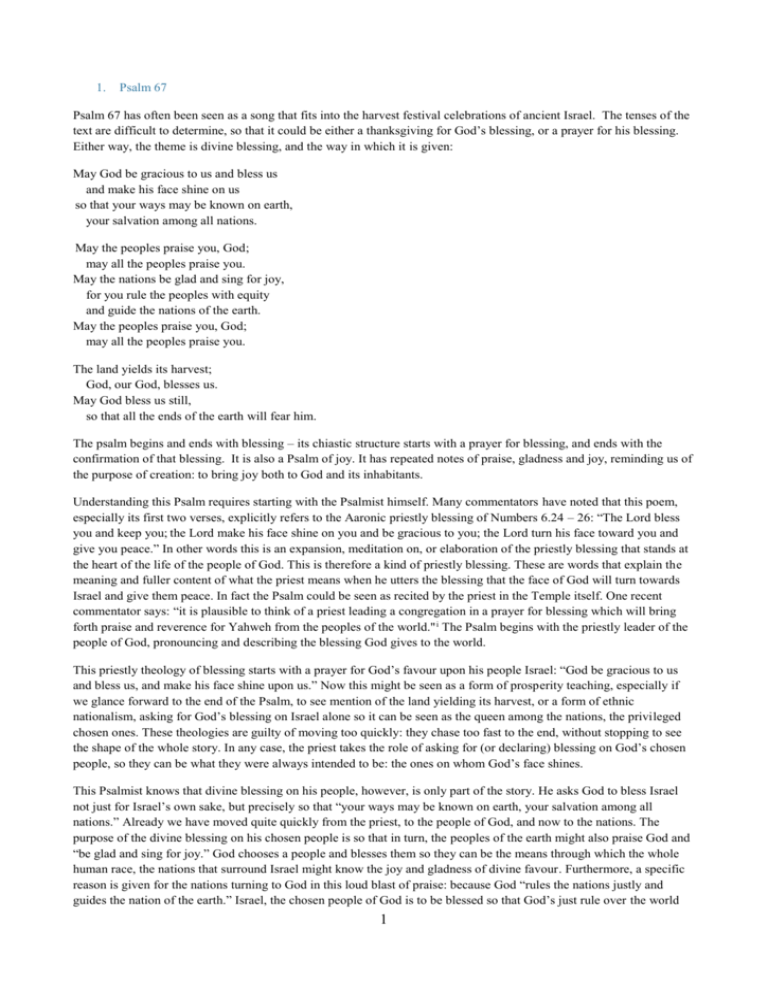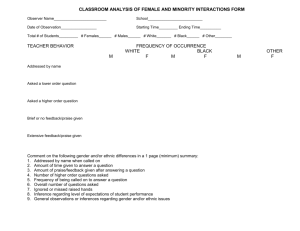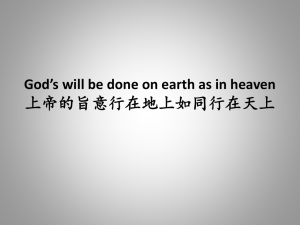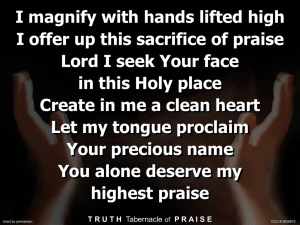Seminar papers
advertisement

1. Psalm 67 Psalm 67 has often been seen as a song that fits into the harvest festival celebrations of ancient Israel. The tenses of the text are difficult to determine, so that it could be either a thanksgiving for God’s blessing, or a prayer for his blessing. Either way, the theme is divine blessing, and the way in which it is given: May God be gracious to us and bless us and make his face shine on us so that your ways may be known on earth, your salvation among all nations. May the peoples praise you, God; may all the peoples praise you. May the nations be glad and sing for joy, for you rule the peoples with equity and guide the nations of the earth. May the peoples praise you, God; may all the peoples praise you. The land yields its harvest; God, our God, blesses us. May God bless us still, so that all the ends of the earth will fear him. The psalm begins and ends with blessing – its chiastic structure starts with a prayer for blessing, and ends with the confirmation of that blessing. It is also a Psalm of joy. It has repeated notes of praise, gladness and joy, reminding us of the purpose of creation: to bring joy both to God and its inhabitants. Understanding this Psalm requires starting with the Psalmist himself. Many commentators have noted that this poem, especially its first two verses, explicitly refers to the Aaronic priestly blessing of Numbers 6.24 – 26: “The Lord bless you and keep you; the Lord make his face shine on you and be gracious to you; the Lord turn his face toward you and give you peace.” In other words this is an expansion, meditation on, or elaboration of the priestly blessing that stands at the heart of the life of the people of God. This is therefore a kind of priestly blessing. These are words that explain the meaning and fuller content of what the priest means when he utters the blessing that the face of God will turn towards Israel and give them peace. In fact the Psalm could be seen as recited by the priest in the Temple itself. One recent commentator says: “it is plausible to think of a priest leading a congregation in a prayer for blessing which will bring forth praise and reverence for Yahweh from the peoples of the world." i The Psalm begins with the priestly leader of the people of God, pronouncing and describing the blessing God gives to the world. This priestly theology of blessing starts with a prayer for God’s favour upon his people Israel: “God be gracious to us and bless us, and make his face shine upon us.” Now this might be seen as a form of prosperity teaching, especially if we glance forward to the end of the Psalm, to see mention of the land yielding its harvest, or a form of ethnic nationalism, asking for God’s blessing on Israel alone so it can be seen as the queen among the nations, the privileged chosen ones. These theologies are guilty of moving too quickly: they chase too fast to the end, without stopping to see the shape of the whole story. In any case, the priest takes the role of asking for (or declaring) blessing on God’s chosen people, so they can be what they were always intended to be: the ones on whom God’s face shines. This Psalmist knows that divine blessing on his people, however, is only part of the story. He asks God to bless Israel not just for Israel’s own sake, but precisely so that “your ways may be known on earth, your salvation among all nations.” Already we have moved quite quickly from the priest, to the people of God, and now to the nations. The purpose of the divine blessing on his chosen people is so that in turn, the peoples of the earth might also praise God and “be glad and sing for joy.” God chooses a people and blesses them so they can be the means through which the whole human race, the nations that surround Israel might know the joy and gladness of divine favour. Furthermore, a specific reason is given for the nations turning to God in this loud blast of praise: because God “rules the nations justly and guides the nation of the earth.” Israel, the chosen people of God is to be blessed so that God’s just rule over the world 1 can be both recognised and established, and his divine governance which directs the overall course of history, despite its twists and turns, tragedies and delights, might be revealed. And when they are, the peoples will in turn join in the song of praise to God, the song of harmony when the nations unite in praise to their maker. And yet there is more. When the “peoples praise you” (v5), the earth itself “yields its harvest”. The result of the nations being brought to the praise of God is felt, even in the soil, the dirt of the earth itself. The earth becomes fruitful, supporting life, giving joy, just as it was always meant to. Even the inanimate creation joins in the song, becoming fruitful and sustaining life in the way it was always meant to. The Psalm comes to its triumphant conclusion in the final note of the praise of God. As the land brings forth fruit, it provokes thanksgiving for divine blessing in which the world lives in harmony, with the whole earth (or literally ‘the ends of the earth’) respecting, worshipping, united in praise, in harmony with God the Creator. The produce of the earth is not an end in itself, but is a means to the praise of the God and the joy of creation. ii Derek Kidner entitles this Psalm ‘The Spreading Circle’, and it’s not hard to see what he means: here is the spreading circle of God’s blessing from the church, to the nations to the whole earth itself. iii What is not yet in sight is the precise shape of this blessing in Christ-like form. The New Testament will fill out both the form which this redeemed humanity will take in Christ, and the hard-won cost of this harmony to God. This is a Psalm which does not really deal with the realities of a broken, sinful world, and its need for redemption and healing as well as for fulfilment. Nonetheless, even with its incomplete nature, here we see the whole divine plan of blessing outlined, even in reverse: God uses priests to bless his chosen people, who are to turn the nations to the praise of God so that in turn, the earth itself is brought to fruitfulness, to the praise of God and the joy of both Creator and Creation. i Tate, M. E. (2010). Psalms 51-150. Nashville, Thomas Nelson. p155. Weiser, A. (1962). The Psalms: a Commentary, SCM Press. p474 iii Kidner, D. (1973). Psalms 1-72: An Introduction and Commentary. Nottingham, Inter-Varsity Press, 2008. p236. ii 2.. Eight Propositions Here are eight propositions about a healthy theology of priesthood. 1. God’s main desire is to bless his creation and to bring it to its fulfilment. He does that through Christ, the one mediator between God and creation. And yet he chooses to involve us in various ways in that priestly blessing. That is our privilege, as human beings, as the church, or as priests. 2. We human beings are fully part of the rest of creation, not exalted above it. Richard Bauckham speaks of the ‘fellowship of creation’, and he is quite right: rather than being superior, separate from and dominant over the rest of creation, a proper theology of our priestly role within creation tells us we are fully part of it, sharing in its nature and to a certain extent, its fate. As St Francis saw so clearly, the sun, moon, water, air, fire, not to mention the animals themselves, are our brothers and sisters, not our servants. 3. We humans stand under a divine calling. We may be part of creation, but are graced with a special responsibility to care for that creation, developing it and protecting it from harm. This brings responsibility but also dignity, as it is a calling that rests on every human being, not just its political leaders. Each one of us is given a small part of creation, be that a school, a business, a family, a garden, a bedroom even, to nurture and protect just as Christ himself would. 4. The church is fully part of the rest of humanity, not better or separate, exalted above everyone else. Being called by God to be a priestly people does not make Christians any less a part of the rest of humanity, subject to the same impulses, desires, struggles and joys. This again is a relief, making us a little more patient with our fellow-Christians, but also enabling us to reach across to other people, not down to them. Christians have more in common with non-Christians than we sometimes like to think! 5. The church’s primary calling is directed towards people, drawing people back into fellowship with God through Christ, in its evangelism, compassion and worship. It makes the church’s role a little more 2 manageable. It is not primarily the church’s calling to care for creation: that is the human calling. It is not the church’s job to produce the best music, art, science or literature: that is the human vocation, not just the Christian one. We need not get too distressed if some of the best art or science happens outside the church. As church we do our bit, but we rejoice every time technology produces useful things, flood defences are raised, laws are passed that protect green fields or rain forests. It is the church’s task to join in Christ’s praise of the Father on behalf of the rest of humanity, to urge the friends and family we have to be reconciled to God, and to demonstrate what it means to live a fully, and richly human life. 6. The primary identity of priests is as baptised Christians, deeply identified with the church and its members. They are lay before they are leaders. They are part of a priestly people, called to serve those very people and do whatever it takes to ensure their maturity in Christ. They are priestly, not in any sense exalted over the Christian community, but called to bring it the divine blessing so that it can be perfected and offered to God as an act of worship. 7. Priests are called to serve the church, to bless the church, and enable it to glorify Christ its true head. They might like to focus directly on political activism or creation care, but their primary role is to develop a community of Christians who are themselves politically active and doing what they can to care for their part of creation. Priests are not meant to by-pass the church, but enable the church to be itself. 8. The purpose of creation is joy. In a world where we are often made to feel that the purpose of life is work, production, success, wealth or a host of other things, the reminder that we are here in the fullest sense to enjoy God, ourselves and the creation is a huge relief, and a reminder that our selves are here to be enjoyed in Christ, not to be taken too seriously. We are here for glory of God, which happens when we enjoy him and his creation to the full. 3. Priestly Leadership? The Green report on ‘Talent Management for Future Leaders’ in the Church of England has raised something of a storm. Its defenders argue that something needs to be done to increase the ability of senior leaders to manage large churches, cathedrals or dioceses - increasingly complex organisations in a fast-changing world. These days the average Vicar, Dean or Bishop has to manage paid staff, keep an eye on the budget, be a teacher, fundraiser, pastor, visionary and local community organiser, while keeping sane into the bargain. Critics of Green complain of what they see as a bland managerial mindset, which is destined to produce not visionary, prophetic clergy but boring middle managers. They point to the need for holiness rather than efficiency, purity not profit, for representatives of Christ, not of 'Church of England Inc.'. They fear the sacrifice of a rich Christian culture of saintliness on the altar of productivity and growth. This conflict reflects a deeper dispute that has been running for some time in the Church over the language we use for those in responsibility. Evangelicals are fond of speaking of Leadership and of leadership training. Catholics prefer the language of Priesthood and priestly formation. But are these fundamentally incompatible? And if they aren't, does the language of priesthood have anything to offer the leadership paradigm? Critics of leadership language often fear that secular norms are being smuggled into the church, but might a re-imagining of leadership in priestly terms actually reverse the process, with Christian notions of leadership beginning to infiltrate the world of business and politics? Any theological understanding of Priesthood has to begin with the unique priesthood of Christ. In the book of Hebrews, Christ is the unique High Priest in a number of ways. First, he mediates between God and humanity, being 'the exact imprint of God’s very being' yet also 'like us in every way', sharing in our flesh and blood. Secondly, he perfects human nature, ''being made perfect through his suffering', becoming a 'high priest, holy, blameless, undefiled' - taking up human nature and perfecting it in the living of a complete, mature, total human life. Thirdly, he offers that complete human life as an act of sacrifice to the Father, offering the ultimate act of worship - a perfect life given and surrendered as an offering to God. These three actions - mediating, perfecting and offering are the signs of the priesthood of Christ. Of course the New Testament also calls the church a 'royal priesthood' because Christ's priestly work is carried out in the world precisely through the church mirroring this same pattern. The church also follows this Christ-like pattern in mediating between God and humanity, being in one sense, a very mundane and fallible human organisation, yet at the same time being the glorious body and bride of Christ. The church also perfects, being the arena in which the Spirit converts and nurtures ordinary human beings into godlike, Christlike holiness. It also offers a sacrifice of praise, joining in the worship of Jesus Christ, in offering itself and its life as a 'living sacrifice' of worship. 3 We might even go further to argue that we see the same pattern in the entire human race, called to mediate between God and creation (made from the dust, yet bearing the image of God), to perfect that Creation (through art and technology which both develop and care for the Creation) and offer it back to God in acts of worship and devotion. And of course the reason clergy are sometimes called priests is because Christ exercises his priestly work in the church through ministers who follow he same pattern. They too mediate, being on the one hand still fully lay Christians, yet on the other, called out of the main body as examples of Christ to serve his people. They also perfect, through the ministry of Word and Sacrament that feeds and nurtures, helping to form the body into the beautiful bride of Christ. And they offer the church back to God, through prayer and spiritual formation, 'presenting everyone mature in Christ' in what St Paul calls 'the priestly service of the gospel of God, so that the offering of the Gentiles may be acceptable, sanctified by the Holy Spirit.' If this is what priesthood consists of, mediating, perfecting and offering, it gives us the beginnings of a Christian vision of leadership. Priestly leaders do not dominate, they mediate. By entering into the experience of others, they create and forge community by bringing together what would otherwise be at loggerheads or separated. They make connections between unlikely people and institutions, and hold together communities that might otherwise break apart in disunity and division. Priestly leaders do not placate, they perfect. Rather than aiming to keep everyone happy, they are fiercely dedicated, not to the furtherance of their own careers, but to the nurture, growth and development of those in their care and the institutions they are called to preserve and develop, even when that means making tough and unpopular decisions. They keep their eye on the goal, the big picture, the ultimate purpose of all things. And finally, the purpose of their work is not self-glorification, but offering. They work hard, not out of some secular work ethic, but because they remember that the goal of their work as leaders is not ultimately the success of their organisation, the year-end profit margin, or even the number of people affected, but to serve a much greater and higher goal: the creation of something good, life-giving and worthwhile - an offering worthy of God the Creator himself. Human work is noble activity, ultimately finding its purpose in worship - the Sabbath offering of all that has been done and achieved not to the glory of the creature but the Creator. This kind of leadership offers a way of holding together our distinctive Christian language of priesthood, taking its cue from the priesthood of Christ, with talk of leadership that is capable of enabling complex organisms, such as churches, or even businesses to flourish. It offers something characteristically Christian, from which even the most exacting MBA might learn. 4









